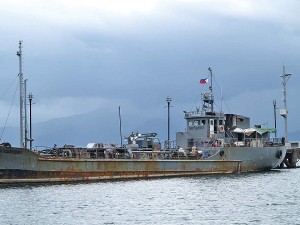SUBIC BAY FREEPORT—A United States Navy vessel, which has been at the center of a waste dumping issue in Philippine waters, has no waste treatment facility, contradicting claims by a contractor that what it receives from the vessel are pretreated wastes, the ship captain said on Friday.
Capt. Glenn Pendrick, commanding officer of the submarine tender USS Emory Land, told Akbayan Rep. Walden Bello and Subic Bay Metropolitan Authority (SBMA) Chair Roberto Garcia that the ship “has no waste treatment facility [which is why] we hire third party contractors.”
In earlier media interviews and press statements, retired Vice Admiral Mateo Mayuga, president of the Glenn Defense Marine Asia Philippines Inc., claimed that wastes from US vessels collected by his firm were pretreated.
“Domestic waste in US Navy ships is pretreated, in accordance to their standard procedure,” Mayuga said in a statement this week.
Glenn Defense’s defense
The SBMA has been investigating Glenn Defense for supposedly dumping untreated wastes in Subic Bay. The company, however, disputed the allegation against it, saying Glenn Defense was following international and local laws on waste dumping and that wastes collected from US Navy ships were dumped outside Philippine waters.
Results of the test conducted by the Subic Water and Sewerage Co. on samples of effluents taken last month from MT Glenn Guardian, a vessel of Glenn Defense, showed these to have exceeded Philippine standards for dumping. The wastes were taken from USS Emory Land.
Subic Water officials said while they could not say whether the waste water sample was toxic or not, if not fit for release in the environment, “as the organic content was beyond the permissible limits.”
Pendrick, who received Bello as a guest in his ship along withSBMA representatives and reporters, said he was aware of the allegations against Glenn Defense. “The US Navy is already investigating this,” he said.
“[The US Navy is] committed to being good stewards of the environment… which is why when we hire third party contractors, it’s in the contract that they follow all international and local laws,” he said. Pendrick said his ship generates and disposes of gray water, oily waste and sewage.
When asked by Bello, Pendrick said the USS Emory Land, being a submarine tender, also “has the ability to extract nuclear waste” from nuclear submarines. He said, however, that this was not typical and the nuclear waste is usually dumped in designated areas in the US territory.
Bello later told reporters that the audience with Kendrick has raised various concerns.
“Foremost is the admission that the Emory Land has the capacity to extract nuclear waste,” he said. Bello said the national government has to step in and conduct an investigation of the incident.
The lawyers of Glenn Defense initially invoked the Visiting Forces Agreement when the SBMA asked it to answer its “show-cause” letter on the waste dumping in Philippine waters. Glenn Defense, however, backtracked and said it was not covered by the VFA.
Aquino’s silence
Bello said President Aquino has to respond to this issue. “They can no longer keep quiet. They should have done something when the incident first came out, instead of letting the SBMA conduct the investigation on its own,” he said. Earlier, the SBMA said results of its initial investigation showed that there was no evidence that any toxic waste, such as nuclear, chemical or hazardous waste, had been discharged in Subic Bay.
“Neither is there evidence that oily wastes or sewage wastes have been dumped in our waters,” an SBMA statement said on Monday.
But Bello said investigation into the issue is not over yet.
No capacity of knowing
“Obviously, the SBMA has no capacity to know if there were really toxic elements present in the [waste from US ships]. We have to look into that, as well as past incidents,” Bello said.
He said a broader investigation has to be pursued since “Subic is the front line of the country in the pivot strategy of the Obama administration in the Pacific region.” Garcia said the SBMA was standing by the result of Subic Water’s test on the toxicity levels of the waster water sample after Mayuga questioned its integrity and the methods used in collecting and testing the sample.
Garcia said the SBMA is continuing its investigation and performing due diligence on Glenn Defense’s past operations in the freeport.
Bases Conversion and Development Authority Chair Felicito Payumo, a former SBMA chair, said the US Navy cannot be faulted in this incident because “that’s the reason why they pay these contractors well, to do their job properly.
“The US Navy is responsible; they wouldn’t dump their waste in Subic [or in Philippine territory]… Why would they hire contractors in the first place?” Payumo asked.


